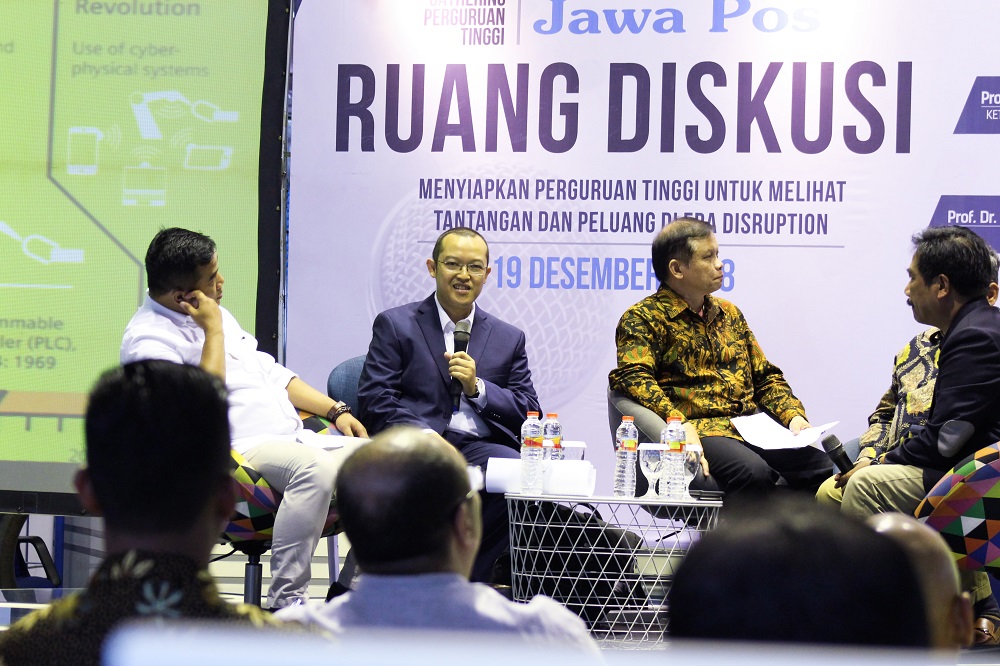UNAIR NEWS – Higher education is expected to produce competent candidates who are ready to face work industry along with current technology, work skills, adaptability and dynamic mindset. That is several aspect that universities really need to face Industrial Revolution 4.0. One way to face it by reforming curriculum.
The discussion entitled Gathering of East Java Universities was held in discussing various university issues challenges to face the 4.0 Industrial Revolution. Precisely on Wednesday, 19 December at Jawa Pos Lounge, 4th Floor, Graha Pena.
There were public relations employees from several university, Dr. Ir. Patdono Suwignjo, M. Eng., Sc., As Director General of Institutions (Science and Technology) Ministry of Research, Technology and Higher Education; Prof. Badri Munir Sukoco SE., MBA., Ph.D., as Professor of FEB Universitas Airlangga; Prof. Dr. Ir. Djwantoro Harjito, M. Eng, as Rector of PETRA Christian University; and Akhyari Hananto as founder of GNFI & throughout Asia. Moderated by Head of Information and Public Relations Center (PIH) UNAIR Dr. Suko Widodo, M. Si., The discussion raised theme of “Preparing Universities to Face Challenges and Opportunities in the Age of Disruption”.
The efforts of preparing universities to face revolution 4.0 continues to be carried out by government. One of them is through Ministry of Industry with Making Indonesia 4.0 project. Especially in order to achieve a number of strategies with collaborative steps between several stakeholders. Starting from government institutions, academics, industry players, and associations.
“The existence of Revolution 4.0 caused 75,000 from 325,000 positions replaced with new positions,” said Dr. Ir. Patdono in his presentation.
“We need to realize this changes (the impact of Industrial Revolution 4.0, ed) must be addressed together with self-improvement between university to achieve the quality of student competency quality,” he added.
Furthermore, Dr. Ir. Patdono said that the function of a school sertificate is currently experiencing a shift but it does not mean that it is not important. Precisely we need to improve competence skill.
“New competencies are needed such as: digital competencies, big data competencies, and human literation,” he said.
In addition, these competencies are not only related to graduates or students, but also teachers who should be suitable and qualified. Professional certification institutions are part of universities demands to fulfill quality standards of education towards Industrial Revolution 4.0.
“If university doesn’t guide their students, then graduates will be difficult to get a job,” he said.
“Thus, the reputation of the university will be affected with that. With that being said, there will be no students who want to study in there, “added Dr. Ir. Patdono.
Continuing the presentation, Prof. Badri said that university must direct their curriculum to improve students’ creative abilities such as: the ability of dealing with social change trends that occur with new inventions of creativity, a.k.a be active and finding new solutions.
“Students are encouraged to be creative,” he said.
On the other hand, Dr. Suko Widodo acknowledged that Industrial Revolution 4.0 era was a social phenomenon that had to be faced. It is important for university to improve their student competency. Especially to keep a right proportion between practice and theory given in university.
“If university cannot keep up with revolutionary era 4.0 development, then we will be left behind,” he said.
A number of policies have been prepared by Ministry of Research and Higher Education (Kemenristekdikti) in anticipating and facing the impacts and changes that will occur. One of the effort is reforming university curriculum.
Morover, there was priority differentiation of scientific focus that is adjusted to each university. Including preparing new competency that must be encouraged by lecturer in each university. (*)
Author: Khefti Al Mawalia / Ferries Fenoria





